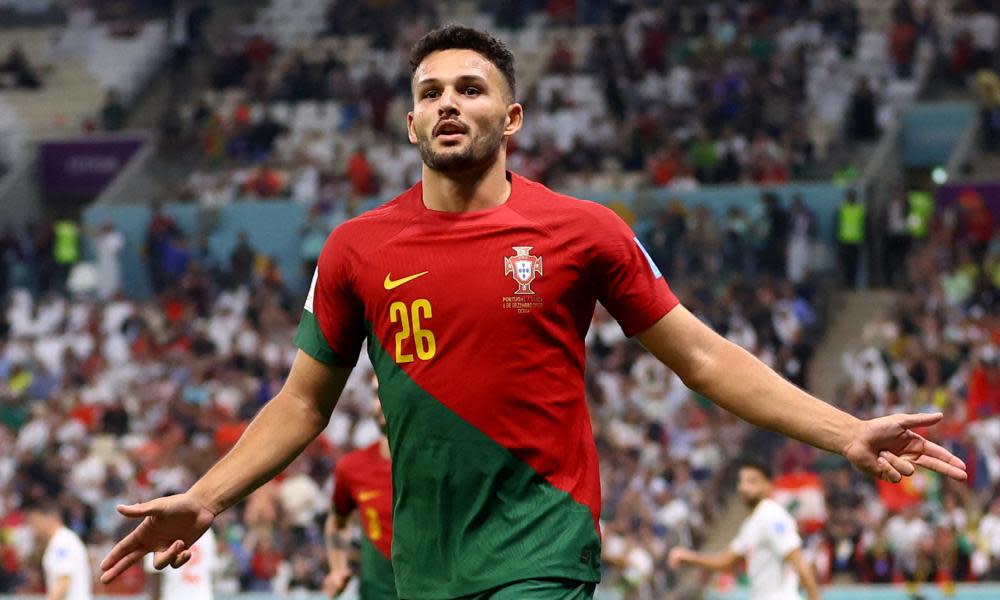How ‘resilient’ Gonçalo Ramos grafted his way to World Cup star status

When Gonçalo Ramos moved from his childhood home in the Algarve to Lisbon to join Benfica’s academy as a teenager he struggled to settle, often crying for his parents. His determination to get through the hard times ensured he would make the most of his talent and helped to mould him as a person.
On Tuesday, at the age of 21, Ramos was not fazed by replacing the national icon Cristiano Ronaldo in Portugal’s World Cup last-16 tie against Switzerland. Those who know him were not surprised he scored a fine hat-trick, and Morocco will be more worried about facing him than a certain former Manchester United striker in Saturday’s quarter-final.
Ramos has a habit of making an impact. For Benfica B he scored seven goals in his first three games and within eight minutes of his first-team debut he had netted a double. Whenever he makes a step up, he is ready.
This is a World Cup like no other. For the last 12 years the Guardian has been reporting on the issues surrounding Qatar 2022, from corruption and human rights abuses to the treatment of migrant workers and discriminatory laws. The best of our journalism is gathered on our dedicated Qatar: Beyond the Football home page for those who want to go deeper into the issues beyond the pitch.
Guardian reporting goes far beyond what happens on the pitch. Support our investigative journalism today.
The forward was spotted aged 12 in the Algarve, where his dad had played professionally for Farense, by Benfica’s Faro talent centre, where he was coached by Miguel Fernandes after being recruited by Pedro Lourenço. After moving 175 miles to the academy in Lisbon he was not a standout performer but coaches identified his potential and worked with him to make the most of his ability.
Benfica mainly used him as a midfielder, No 10 and central striker as he progressed through their system. As with all outfield players in the academy, though, Ramos was rotated around every position except goalkeeper to give a greater understanding of each role.
“Gonçalo was shy and introverted, especially at younger ages,” Benfica’s technical coordinator, Rodrigo Magalhães, says. “He was very humble and had an excellent relationship with his teammates. He was very focused and serene. Regardless of whether he played regularly or not, he was not affected in a negative way. He knew how to turn that into positive energy that drove him to work even harder to achieve his goals.”
Ramos’s hat-trick against Switzerland was not his first in Portugal’s colours. He was integral to his country reaching the final of the 2019 European Under-19 Championship, scoring three in the semi-final against the Republic of Ireland and finishing as the tournament’s top scorer.
“Gonçalo has always been very focused, hard-working, and committed,” Magalhães says. “I think this also comes from the family support he has always had. Gonçalo’s father was a football player and was a very grounded guy. He knew the football context and realised that his son’s growth wouldn’t be as fast compared to some other players of his age group. This helped Gonçalo get through a very challenging period. Then he showed resilience and a strong ability to adapt which were crucial to overcome this most sensitive period of his path.”
In Ramos’s teenage years, coaches focused on improving his first touch and weaker left foot – and anyone who saw his vicious opening goal against Switzerland might not realise he is right-footed.
Despite the two goals on his debut against Aves in the penultimate game of the 2019-20 season, Ramos did not immediately become a regular. “Our goal in Benfica Campus is always to prepare young players for moments of great pressure and responsibility,” Magalhães says. “From the youngest levels, Gonçalo always showed a character and personality that allowed him to face these moments with self-confidence and emotional stability to put his football and qualities into practice.
Related: A short history of World Cup hat-tricks: from Patenaude to Ramos
“Of course, the debut for the ‘A team’ is always a special moment for a young player. He was certainly nervous and emotional, also due to the strong connection and passion he has for the club. But all of this served as a motivating factor for him to give his all and he ended up being the Gonçalo we all knew in that game, scoring two goals.”
Jorge Jesus was appointed in the summer of 2020 and put faith in more experienced strikers, leaving Ramos with only six first-team appearances across a season spent mainly with the B team. Nottingham Forest tried to sign him on loan last January but he was getting more first-team minutes then and eventually found form in front of goal after not scoring in his first 17 appearances; by the end of the campaign he had scored eight.
Darwin Núñez’s departure for Liverpool left great responsibility on Ramos’s shoulders. In 25 games for club and country this season he has scored 18 goals. He made his Portugal debut last month and now is an instant World Cup star.
“Each time a player reaches this level it’s a great feeling of pride, because we all feel that we actively contributed to the development of a player who reaches excellence in the national and international football scene,” Magalhães says.
Whenever an academy graduate makes his first-team debut, the Benfica coaches have a beer together. There is no tradition for a World Cup hat-trick but there will be a few ice buckets prepared for the quarter-final.

 Yahoo Movies
Yahoo Movies 
